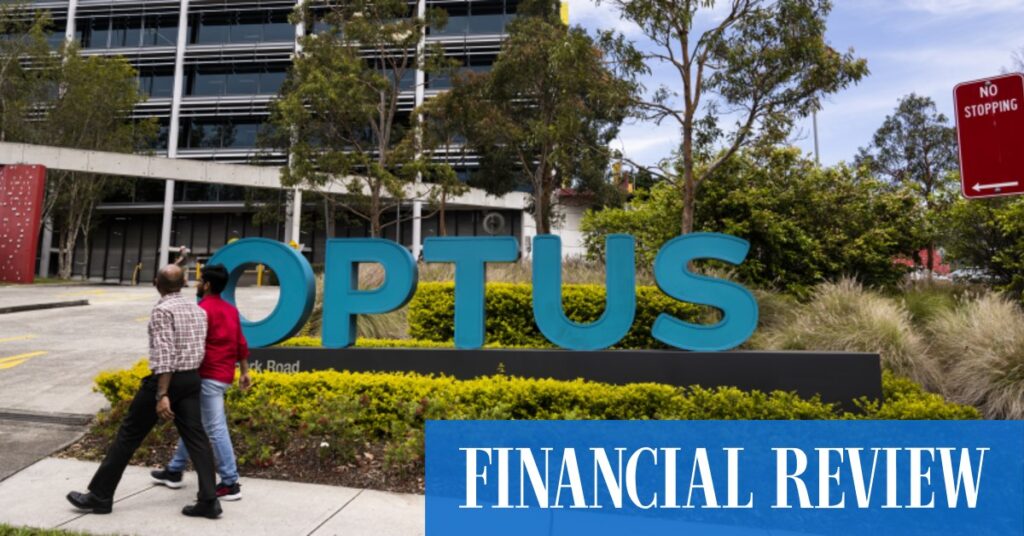Analysts have also begun speculating how much money Telstra and other telco groups could make from picking up disgruntled Optus customers; JP Morgan forecast that Telstra could gain up to $125 million in earnings over the next few years.
Optus, which reported a 14 per cent slide in earnings before interest and taxation to $141 million on Thursday for the six months to September, will not pay cash compensation to people disrupted by the outage.
It will, however, offer 200 gigabytes of extra data at “normal” speeds over one billing cycle to most mobile customers who pay monthly bills on so-called “post paid” plans.
Optus declined to specify the cost of the offer, but it now offers 220 gigabytes for $69 each month. And the most recent bi-annual data from the competition regulator shows most post-paid mobile users use only 14.5 gigabytes each month.
Telsyte managing director Foad Fadaghi said that given Optus’ offer was for free extra usage, rather than a price discount or refund, it was not possible to calculate how much it would cost the company. The amount would depend on how many of its customers downloaded or streamed more things, and how much they used.
“Optus will need to turn to strong crisis management and systems to ensure this doesn’t happen again, the cost of which will be much higher than some free weekend data.”
Athough customers may have expected cash compensation, Mr Fadaghi said the offer reflected the fact that outages would always occur from time to time. A big refund would set an expensive precedent. “All the major networks have outages – for Optus it’s worth learning from the past and avoiding knee-jerk responses given the road to rebuilding trust is long,” he said.
JP Morgan analyst Mark Busuttil said Telstra was likely to benefit from Optus’ outage as customers become less price-sensitive after a day with no service, and sought safety in its larger rival.
Customer churn
More customers were likely to churn from Optus due to the service outage than had fled after last year’s data breach because the cyberattack had not caused any loss of service, Mr Busuttil said in a note to clients.
In the three months following the 2022 data breach, Optus lost 65,000 post-paid mobile subscribers, or 1.1 per cent of its customer base, according to JP Morgan. But Wednesday’s outage was likely to create “more significant churn,” Mr Busuttil wrote.
“A 2.5 per cent churn from Optus to Telstra would be more material and contribute almost $125 million to Telstra’s fiscal 2025 earnings before interest taxation depreciation and amortisation.”
Vodafone’s disastrous “Vodafail” era in 2010-11, where it had numerous outages, cost it 2.5 million customers over three years.
The most recent data from the Australian Competition and Consumer Commission on mobile market share, based on information collated in December, shows Telstra at 44 per cent, Optus at 31 per cent and TPG at 17 per cent. Telstra also dominates the residential broadband market, followed by TPG and Optus.
Telstra declined to comment on whether it was picking up customers from Optus but queues at its stores on Wednesday indicated the nation’s biggest telco group had signed up new subscribers for pre-paid mobile plans and was also handling inquiries from Optus customers wanting to switch their long-term plans.
‘There will be class actions’
TPG said there had been a four-fold increase in sales across all its brands over the past 24 hours including Vodafone, TPG, iiNet, felix and Lebara, sparking its busiest sales day in the past year.
On Thursday, Optus reiterated its apologies for the outage and said its engineers were still investigating the “cascading failure which resulted in the shutdown of services to our customers”.
Mr Fels, who is currently chairman of the governance board of packaging group Visy, said he was surprised that Optus was refusing to disclose the cause of the outage, given it had repaired its networks. He questioned whether the company was worried about exposing itself to legal liabilities.
“It seems certain to me that there will be class actions … the likely question is whether Optus was negligent or failed to exercise due care and skill and that raises the question of whether Optus has underinvested in the network.”
Optus is already dealing with class actions and regulatory investigations related to last year’s cyberattack. It is defending the claims but Singtel has warned investors that it might have to pay damages.
On Friday, the Victorian branch of the Federal Court will decide whether Optus can claim “legal professional privilege” to stop a report by Deloitte on its 2022 cyberattack from being released.
Politicians are pushing Optus to provide more details about the outage. The federal communications department and “a number of agencies” had been in touch with Optus over the past 24 hours, Ms Rowland told the ABC. “Consumers and businesses expect transparency,” she said.
Assistant Treasurer Stephen Jones told the ABC that Optus executives took too long to explain the outage, describing their communications as “sub par.”
“Coming off the back of the previous data breach where they were facing similar calls from customers to explain exactly what was going on, this simply wasn’t good enough.”
Australian Chamber of Commerce and Industry chief Andrew McKellar said Optus’ communications had been a “clown show.”
Yuen Kuan Moon, the chief executive of Optus parent Singtel, briefed analysts and investors as well as staff from Sydney on Thursday on the company’s half-year financial results.
Optus chief executive Kelly Bayer Rosmarin said in a statement that market conditions had been “challenging” due to weak consumer sentiment and inflationary pressures, and Singtel attributed the decline to “structural challenges faced by the enterprise fixed business as well as increases in energy and content costs.”
Singtel’s results disclosed that Optus invested $441 million in its mobile network in the six months to September, and another $394 million in fixed networks and other expenditure.

